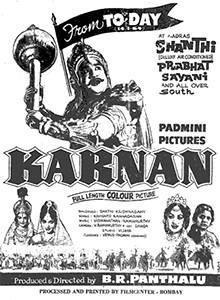| Karnan | |
|---|---|
 Theatrical release poster | |
| Directed by | B. R. Panthulu |
| Screenplay by | A. S. Nagarajan Sakthi T. K. Krishnasamy |
| Based on | Mahabharata |
| Produced by | B. R. Panthulu |
| Starring | Sivaji Ganesan N. T. Rama Rao Savitri Devika M. V. Rajamma S. A. Ashokan R. Muthuraman |
| Cinematography | V. Ramamurthy |
| Edited by | R. Devarajan |
| Music by | Viswanathan–Ramamoorthy |
Production company | Padmini Pictures |
| Distributed by | Sivaji Films |
Release date |
|
Running time | 177–180 minutes[a] |
| Country | India |
| Language | Tamil |
| Budget | est.₹4 million |
Karnan () is a 1964 Indian Tamil-language Hindu mythological film produced and directed by B. R. Panthulu. It stars Sivaji Ganesan leading an ensemble cast consisting of N. T. Rama Rao, S. A. Ashokan, R. Muthuraman, Savitri, Devika and M. V. Rajamma. The film is based on the story of Karna, a character from the Hindu epic Mahabharata.
Karnan, which was officially launched in 1963, was shot in palaces at Jaipur and the war sequences were filmed in Kurukshetra, which featured several soldiers from the Indian Army. The film's original soundtrack was composed by the duo Viswanathan–Ramamoorthy, while the lyrics were written by Kannadasan. The screenplay was written by A. S. Nagarajan and the dialogues by Sakthi T. K. Krishnasamy. The film was the first in Tamil to be colourised using Eastmancolor.
Karnan was released on 14 January 1964, during the festival occasion of Pongal. The film ran for over 100 days in theatres, and later won the Certificate of Merit for the Third Best Feature Film at the 11th National Film Awards. It was considered a milestone in Tamil cinema as it brought together the then leading actors of South Indian cinema, Ganesan and Rama Rao. The film was also partly responsible for a resurgence in films based on Hindu epics in the industry. A digitised version of Karnan was released in March 2012 to critical and commercial success.
- ^ Rajadhyaksha & Willemen 1998, p. 380.
- ^ Vijayan, K. N. (9 August 2012). "CINEMA: Sivaji still drawing them in". New Straits Times. Archived from the original on 21 February 2013. Retrieved 29 October 2012.
Cite error: There are <ref group=lower-alpha> tags or {{efn}} templates on this page, but the references will not show without a {{reflist|group=lower-alpha}} template or {{notelist}} template (see the help page).